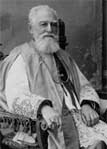|
 Most Reverend Sebastian Gebhard Messmer,
D.D., D.C.L.
Most Reverend Sebastian Gebhard Messmer,
D.D., D.C.L.
1903-1930
Sebastian Gebhard Messmer was born
on August 29, 1847, in Goldach, Switzerland and was the last
European-born Archbishop of Milwaukee. Messmer studied at
the University of Innsbruck, Austria, and was ordained a priest
on July 23, 1871, in Innsbruck. He came to the United States
to serve on the faculty of Seton Hall College in South Orange,
New Jersey in the Newark diocese.
Messmer obtained a doctorate in Canon Law
in Rome before his nomination in 1891 to succeed Bishop Katzer
as the Bishop of Green Bay. He served there for nearly 13
years until he was appointed to succeed Katzer again as Archbishop
of Milwaukee on November 28, 1903.
The question of Catholic ethnicity in Milwaukee
arose again as Messmer softened his former devotion to ethnicity
and instead became a proponent of smoothing over ethnic differences
with his centralizing policies. He became associated with
the American Federation of Catholic Societies, a group seeking
to present American society with a united front on Catholic
issues.
In order to centralize authority in the
Church, he wrote the first Handbook for Catholic Parishioners
in 1907 to establish guidelines for diverse ethnic groups
in the diocese. As the Polish community in the diocese swelled
and insisted on maintaining their distinctive church life,
Messmer became involved in a heated debate with Polish priest
Fr. Wenceslaus Kruszka, which nearly created a serious schism
in the Milwaukee church.
Under Messmer, Milwaukee received its first
two auxiliary bishops. Bishop Joseph Koudelka came to Milwaukee
in 1911 and served until he was transferred to Superior, Wisconsin
in 1913. Bishop Edward Kozlowski was consecrated auxiliary
bishop in 1914 and had only served a year when he suddenly
died. Twenty-nine more orders of religious men and women were
also established in the archdiocese during Messmer’s time.
Known as the “Archbishop of Christian Charity,”
Messmer personally contributed a sizeable amount of the funds
for a charitable bureau that he created in 1916. The Bureau
drew the various child protective organizations in the diocese
under a central administration. Charitable institutions for
the sick, orphaned, poor and aged more than doubled during
Messmer’s administration.
He also played a significant role in education,
as Messmer High School was built and 40 more schools were
added to the Catholic school system. He also appointed Fr.
Joseph Barbian as the first superintendent of schools and
reinvigorated the school board. During his time, Messmer saw
the establishment of Mount Mary College and Marquette College’s
change in status to Marquette University.
Messmer approved the first ministry to African-Americans
when a Catholic couple, Lincoln C. and Julia Valle, organized
St. Benedict the Moor church and school in 1908. He also supported
the establishment of Our Lady of Guadalupe Mission for Mexican
Catholics, which was founded on December 12, 1929. Though
he opposed women’s suffrage, he favored the formation of Catholic
women’s organizations, such as the Marquette Women’s League
and the Milwaukee Archdiocesan Council of Catholic Women.
He also started and encouraged many lay organizations, including
the Archdiocesan Union of the Holy Name Society, the Federation
of American Catholic Societies, the Western Catholic Summer
School, the Knights of Columbus and a revived St. Vincent
De Paul Society.
Archbishop Messmer also founded the Catholic
Herald in 1922, the official Catholic, non-partisan,
English-language paper of the Archdiocese of Milwaukee. He
died on August 4, 1930, while visiting his beloved native
Switzerland and was buried there in Goldach.
|